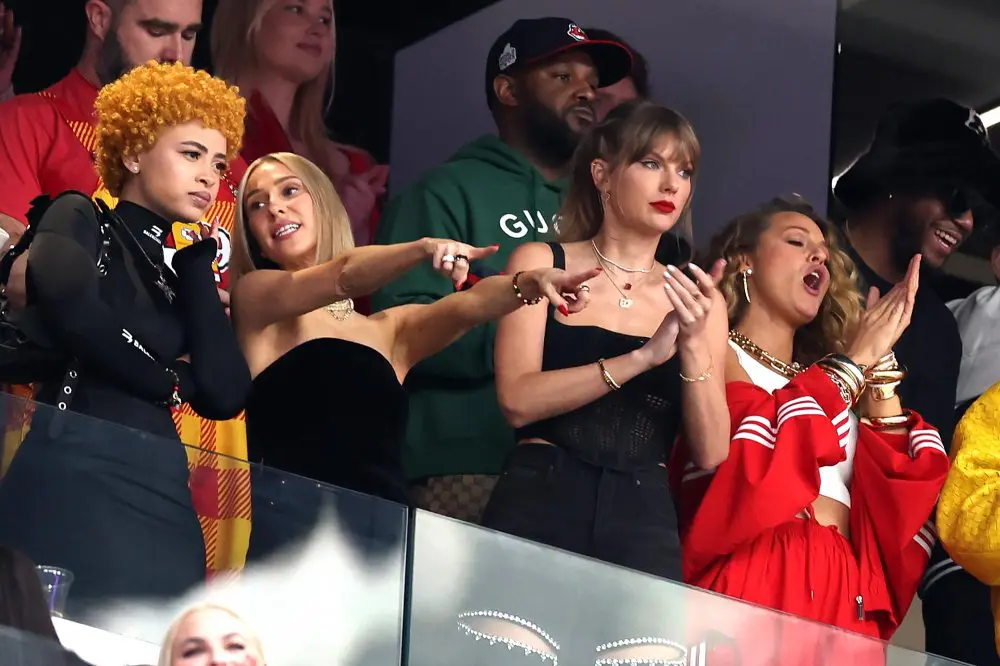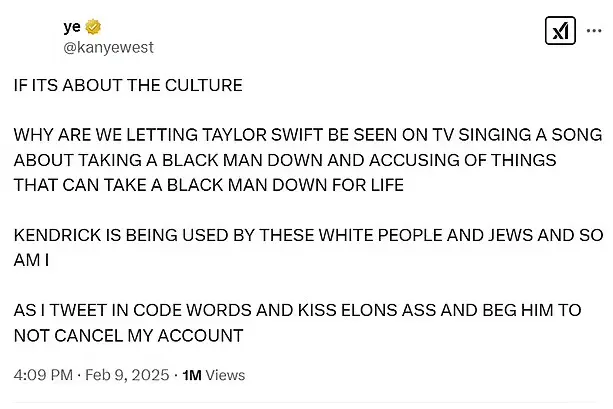Kanye West, the controversial rapper known for his outspoken and often polarizing statements, recently ignited conversations across social media with a bold claim that Taylor Swift has played a significant role in his unsuccessful bid to headline the Super Bowl halftime show. The tension between these two music icons, which has persisted for over a decade, took center stage once again as West expressed his frustrations on X (formerly Twitter) earlier this week. This discussion shines a light on how personal rivalries can spill over into professional opportunities in the entertainment industry, particularly within the context of high-profile events like the Super Bowl.
In 2025, Kanye West, who now identifies as Ye, asserted that his absence from the prestigious halftime show could be traced back to three key moments in his career that seemingly tarnished his image: his infamous remark during a Hurricane Katrina fundraiser where he stated, “George Bush doesn’t care about Black people,” the moment he interrupted Taylor Swift’s acceptance speech at the 2009 MTV Video Music Awards, and his controversial support for Donald Trump, including wearing a MAGA hat. His comments reflect the complex relationship among celebrity, reputation, and public perception, particularly in a world that values social media visibility over traditional public relations.
The history of Kanye West and Taylor Swift’s feud
The relationship between Kanye West and Taylor Swift has been anything but harmonious. Their infamous feud commenced at the MTV Video Music Awards in 2009 when West decried Swift’s win for Best Female Video, claiming it rightfully belonged to Beyoncé. This disruption not only overshadowed Swift’s achievement but also set the stage for an extended rivalry that has resonated throughout the years.
Since that fateful night, their relationship has been marred by both musical references and public spats. For instance, in 2016, he referenced Swift in his track “Famous,” which she asserts he did without her consent. This moment reignited old tensions, paving the way for ongoing verbal sparring through social media and public appearances. West’s fiery statements about Swift, including a more recent outburst following her attendance at the 2025 Grammy Awards, further extended the saga, showcasing how deeply intertwined their careers have become.
Key moments in the ongoing feud:
- 2009 MTV VMA Incident: West interrupts Swift’s acceptance speech.
- 2016 “Famous” Track: Swift claims she was not consulted before reference.
- 2025 Grammy Performance: Swift’s visible reaction to Kendrick Lamar’s performance ignites commentary.

The impact of celebrity reputation on professional opportunities
West’s recent statements about his exclusion from the Super Bowl halftime show underscore a broader conversation surrounding how public persona and reputation can affect professional opportunities in the entertainment industry. Super Bowl performances, often seen as the pinnacle of live music events, come with high expectations and scrutiny, and a negative image may hinder an artist’s chances, regardless of their musical talent.
The significance of public perception is amplified by social media’s omnipresence, where reputations can be built or destroyed in a heartbeat. Celebrity couples, rivalries, and scandals like that of West and Swift often capture public attention, driving discussions that can inadvertently influence career trajectories.
Factors influencing celebrity reputations:
- Public Statements: Controversial remarks can overshadow talent.
- Social Media Presence: Direct engagement with fans can improve or damage reputations.
- Industry Relationships: Collaborations with other artists can enhance or hinder public perception.
The significance of the Super Bowl halftime show
The Super Bowl halftime show serves as an influential platform that can shape an artist’s career, offering exposure to millions of viewers and potential new fans. The importance of this opportunity cannot be overstated, as it has the power to rejuvenate or redefine an artist’s trajectory.
In 2025, notable artists who graced the stage included Kendrick Lamar, showcasing how a well-received performance could lead to unprecedented strength in an artist’s brand. In parallel, the controversy surrounding West’s absence raises questions about the role of personal history in determining professional paths, particularly when juxtaposed with his past comments about other prominent figures.
Implications of the Super Bowl performance:
| Artist | Year | Impact on Career |
|---|---|---|
| Shakira | 2020 | Revitalized her global appeal |
| Dr. Dre | 2022 | Showcased his influence in hip-hop |
| Kendrick Lamar | 2025 | Further cemented his status as a leading voice in music |
The broader cultural implications of celebrity rivalries
Celebrity rivalries often extend beyond the personal lives of the involved parties, influencing societal perceptions of success, fame, and the entertainment industry at large. In a culture where social media amplifies conflicts and highlights opinions, the public consumption of celebrity disputes has morphed into a form of entertainment itself.
With figures like West and Swift at the forefront, their disputes can perpetuate a narrative that encourages conflict over collaboration, leading to a culture that thrives on drama rather than unity. Fans are often drawn into these rivalries, fueling engagement and further perpetuating the saga, all while industry stakeholders watch with intrigue.
Ways celebrity rivalries shape culture:
- Fostering Fan Engagement: Fans often take sides, creating communities around rivalries.
- Influencing Media Coverage: Coverage of dramas can overshadow artistic achievements.
- Shaping Public Discourse: Conversations about rivalries often reflect larger societal issues.
The cycle of controversy and career opportunities
For artists like West, navigating the fine line between controversy and career advancement is a daunting task. His claims about being “blocked from the mainstage” suggest an ongoing struggle with public image and acceptance within the industry. Such statements reflect a broader commentary on how artists’ past actions can sometimes become an impediment to future endeavors, especially for those who have made headlines for less-than-stellar reasons.
The vicious cycle continues as each controversy breeds new attention, but it is crucial for artists to recognize the potential long-term consequences of their actions. Balancing the allure of scandal with career opportunities can prove to be a slippery slope.
Challenges faced by artists in managing controversies:
- Brand Damage: Controversial statements can erode public trust.
- Lost Opportunities: High-profile events may become inaccessible due to past actions.
- Social Media Backlash: Negative publicity can escalate rapidly online.
Conclusion: Navigating fame in a tumultuous environment
Celebrities like Kanye West and Taylor Swift navigate a complex realm of public perception, personal rivalry, and professional opportunities. As both continue to shape and redefine what it means to be a superstar, the impact of their tumultuous relationship serves as a cautionary tale for the music industry. As they both pursue their respective paths in 2025, it remains imperative to consider the broader implications of their stories on current and future generations of artists.
The world of entertainment is ever-evolving, with the influence of social media significantly amplifying both their voices and their rivalries. By understanding these dynamics, we can gain insights into the challenges and triumphs of navigating fame in this turbulent environment. The celebration of artistic achievement must coincide with a careful awareness of one’s public persona—including how past actions can reverberate through time.

I’m Mikael, a 35-year-old Gossip Gravity Creator. I’m passionate about curating captivating content that sparks conversations and ignites curiosity. Join me on this exciting journey as we explore the fascinating world of gossip and trends together!



